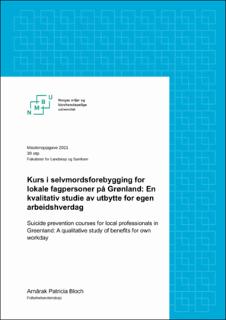Kurs i selvmordsforebygging for lokale fagpersoner på Grønland : en kvalitativ studie av utbytte for egen arbeidshverdag
Master thesis
Permanent lenke
https://hdl.handle.net/11250/2832727Utgivelsesdato
2021Metadata
Vis full innførselSamlinger
- Master’s theses (LandSam) [1034]
Sammendrag
Bakgrunn: Selvmord er et stort og alvorlig folkehelseproblem på Grønland. Spesielt ungdom dør av selvmord, og det er et behov for å støtte og utdanne fagpersoner for å forebygge selvmord i grønlandske lokalsamfunn. Denne masteroppgaven undersøker erfaringene og kunnskapen blant fagpersoner som deltok i det nasjonale selvmordsforebyggende kurset Livsliniekurs på Grønland i løpet av 2018. Og videre, for å undersøke, hvilke erfaringer som anses som meningsfylte i sitt arbeid. Nasjonale kurs i selvmordsforebygging leveres som en del av den nasjonale (grønlandske) strategien for selvmordsforebygging 2013-2019.
Metode: I denne oppgaven er det valgt kvalitativt design. Det er gjennomført syv semistrukturerte kvalitative intervju med syv førstelinje fagpersoner fra skole og helsevesen i en kommune i Sørgrønland og i en i Vestgrønland, som deltok på Livsliniekurset våren 2018.
Resultater: Fagpersonenes tidligere følelsesmessige utfordringer som frykt, bekymringer for selvmord, maktesløshet og hjelpeløshet i møte med personer i risikogruppen har gjennom kurset blitt erstattet med dypere forståelse for situasjonen. Med dette har evnen til å håndtere selvmordsforebyggingen blitt bedre. Verktøy fra kurset fremmer fagpersonenes håndtering av selvmordsforebygging i deres arbeid. Analysen viser at det å bruke tid på å lære verktøyene, oppleve sosial samhørighet i form av å støtte hverandre i det å bryte tabu, vise medfølelse med hverandre og i møte med målgruppen, samt å oppleve mindre ensomhet i denne type arbeidsoppgaver, fremmer fagpersonenes håndtering av selvmordsforebygging i deres arbeid.
Konklusjon: Resultatene fra denne oppgaven viser at det å øke kompetanse ser ut til å være viktig for at fagpersoner skal oppleve å gjøre jobben på en god måte for personer de møter i sitt arbeid og for å møte situasjonen selv. Vilje og motivasjon til å forebygge selvmord i eget arbeid er basert på at jobben føles meningsfullt og mulig å mestre. Opplæring av fagpersoner som er sentrale i barns og unges liv, som f.eks. lærere og helsepersonell, viser at kunnskap, kompetanse og verktøy er nødvendige i selvmordsforebygging hos målgruppen. Background: Death by suicide is a major public health issue in Greenland. Especially youth die by suicide and there is an urgent need to support and educate front-line workers to prevent suicide in Greenlandic communities. This master's thesis investigates the experiences and knowledge gained among front line workers who participated in the national suicide prevention course, Livsliniekurs (Danish LifeLine), held in Greenland during 2018. And further, to investigate, what experiences are considered meaningful in their work. National courses in suicide prevention are delivered as a part of the National (Greenlandic) Strategy for Suicide Prevention 2013-2019.
Method: Semi-structured qualitative interviews were conducted with 7 front-line workers in a Municipality in South Greenland and in Western Greenland who had participated in the suicide prevention course (Livsliniekurs) during Spring 2018.
Results: The front-line workers' previous emotional challenges such as fear, concerns about suicide, powerlessness and helplessness when facing people at risk have been replaced throughout the course with a deeper understanding of the situation. With this, the ability to deal with suicide prevention has improved. Tools from the course help promote the professionals' ability to handle suicide prevention in their work. The analysis shows that spending time practicing the tools, experiencing social cohesion in the form of supporting each other in breaking taboos, showing compassion for each other and in the face of the target group as well as absence from loneliness in this line of work promotes the front-line workers' ability to handle suicide prevention in their work in a meaningful way.
Conclusion: The results from this thesis show that increasing competence and a set of tools are important for front-line workers in order for them to experience that they are doing a good job for people they meet in their work and to face the difficult situations themselves. The willingness and motivation to prevent suicide is based on the fact that their job feels meaningful and possible to master. Training of professionals who are central to the lives of children and young people, such as teachers and health personnel, shows that knowledge, competence, and tools are necessary in suicide prevention among the target group.

